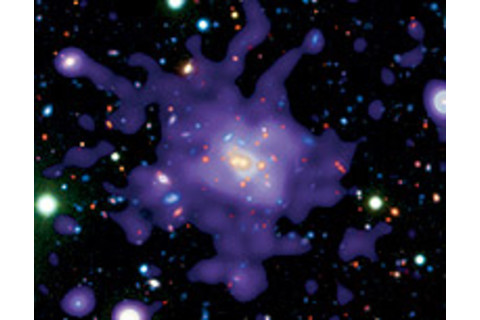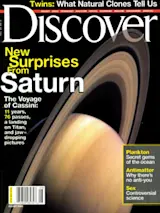Two years ago, an all-star scientific panel compiled the 11 greatest unanswered questions of physics (Discover, February 2002). Now a group within the White House’s National Science and Technology Council has mapped out a

Courtesy of NASA/CXC/ESO/P. Rosati et al.
Galaxy cluster RDCS 1252.9-2927 is full of hot X-ray-emitting gas (purple in this composite image). Scientists believe the cluster is held together by a mass of invisible, as yet unidentified particles.
strategy to uncover the answers. It will draw on input from top minds at NASA, the Department of Energy, and the National Science Foundation. “These are our marching orders,” says astrophysicist Michael Turner of the University of Chicago, who chaired the original panel. “The three agencies involved are going to make sure the research happens as fast as their budgets will allow.”
The plan assigns top priority to investigating dark energy, an all-pervasive, mysterious force that seems to be pushing the universe apart at an ever-increasing pace. The tools to do this are already on the drawing boards. A space-based telescope, tentatively named the Joint Dark Energy Mission, will map the expansion of the universe, while a complementary instrument on the ground will map clusters of mass in the cosmos. The experiments are expected to take 10 years to build, Turner says. Other urgent goals include the construction of an underground facility to study exotic subatomic physics—including hypothetical invisible particles known as dark matter—and an expanded effort to search for gravity waves, which are ripples in the structure of space and time.
Physicist Patrick Looney of the White House’s Office of Science and Technology Policy recognizes that there is no guarantee these projects will answer all the questions. “But I do believe that discoveries about dark matter and dark energy will have a disproportionate effect on science,” he says. “They could tell us that there is physics at the level of particles and fields that we do not understand. By looking at things on the grandest cosmic scale, we can learn about the universe at the smallest scale. That is pretty profound.”














